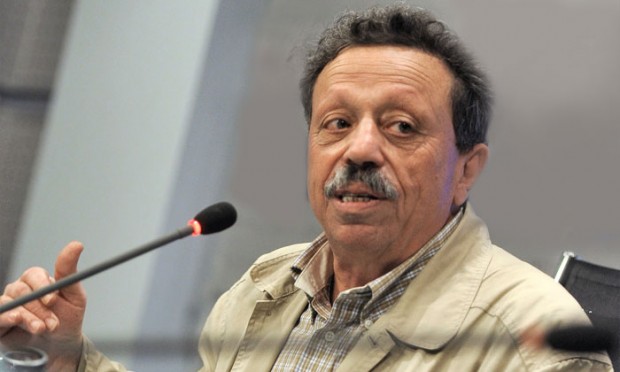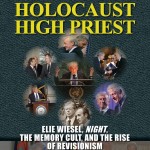Posted on May 19, 2015 at 8:54 pm
Israel Shamir says “Wiesel was there.”

Israel Shamir is a Russian-born Jew who converted to Orthodox Christianity. Norman Finkelstein said of Shamir: “He has invented his entire personal history. Nothing he says about himself is true.”
Warren B. Routledge, author of the new unauthorized biography of Elie Wiesel, Holocaust High Priest, has thankfully CORRECTED some statements made by Israel Shamir in an email to Michael Santomauro referring to my May 11 interview with Routledge. The Shamir comment was posted at Santomauro’s Reporter Notebook Yahoo Group.
Shamir wrote that he knew Wiesel had spent time in Auschwitz because “a good personal friend, a French writer Piotr Ravich (spelling?),” said he did. It doesn’t seem to bother Shamir that this is hearsay, nor that he doesn’t know the spelling of his good, personal friend’s last name! He made some other errors of fact in his email. Here is the full text:
From: <[email protected]> on behalf of Israel Shamir [email protected] [ReportersNotebook]
Sent: Thursday, May 14, 2015 1:00 AM
To: [email protected]
Subject: Re: Listen to The Heretics’ Hour Monday nightThere are many funny and dubious points about Wiesel, but he definitely was an inmate in Auschwitz. I had a good personal friend, a French writer Piotr Ravich (spelling?), who won the prix Goncourt. He committed suicide in 1970s, was a wonderful man, quite cheerful. So this Piotr Ravich had spent four years in Auschwitz, as much as anybody, and he knew Wiesel there. They belonged to the elite of the prisoners. Ravich was a translator and interpreter for the administration. Anyway Wiesel was there.
Mauriac played a very important part in Wiesel career, I do not know whether he lusted after him and I do not know whether Wiesel was a gay, but Mauriac’s Catholic faith played a very important part in the story. This is well described in many texts.
I next heard from Warren Routledge informing me that Shamir had made a number of errors in what he had written, and he, Routledge, intended to answer him. Here is Routledge’s response:
This is a follow-up to Israel Shamir’s friendly post in response to Frank Scott’s negative comments about my unauthorized biography of Elie Wiesel, entitled Holocaust High Priest.
I would just like to add a few comments to what Shamir wrote. His statement that his friend, Piotr Rawicz, “knew Wiesel there,” [Auschwitz] and the assurance he gives us that “Wiesel was there” [Auschwitz] are simply not true.
It is possible, however, that Wiesel and Rawicz could have met at some point, however briefly, after the war, when they had each established themselves in the mainstream media as Holocaust camp veterans within just a few years of each other.
Ravicz published his one and only novel Le Sang du ciel, a modernist work in the surrealist vein, in 1961, and received the Rivarol Prize (awarded to a writer born in a linguistic framework other than French) for it in 1962. Shamir also states erroneously that Rawicz received the highly-prestigious Goncourt Prize, which is not the case. Wiesel published La Nuit in 1958 and he also received the Rivarol Prize in 1963 for that work and several other short novels published in the early 1960s.
Each first novel was translated into English, Wiesel’s as Night in 1960, with another one, by his wife in 2006, which is discussed in great detail in my book. Likewise, Rawicz’s novel was translated as Blood from the Sky in 1964, with another, completely separate, translation in 2004.
Shamir states that Rawicz spent “four years at Auschwitz, as much as anybody,” yet Rawicz and his commentators actually only make claims for him being there for two years, from 1942 to 1944, when he was transferred to Terezin.
Rawicz, both in his novel, and in his later life as a literary critic in France, was always very vague, even elusive, about his time spent in Auschwitz. To my knowledge, he never divulged his ID number, date of arrival, block assignment, or other personal information relating to his work duties other than to say he served as a translator while there. In this regard, his friend, the British literary critic and author of the 2004 translation of his novel, Anthony Rudolf, has written of him: “Rawicz was the first to admit that his experience of Auschwitz was not the worst possible.”
What does this mean?
Such reserve is very strange indeed for someone whose career benefited immensely from his aura as a “survivor.” It also stands in opposition, by its prudence, to the outright mendacity and chutzpah of Wiesel who claimed in Night to have seen two massive flaming pits in close proximity to the main gate into which dump trucks were unloading living adults (Pit 1) and living children (Pit 2).
Rawicz’s “silence” about his claimed stay at Auschwitz was such that, before his suicide in 1982, he never described what his life was actually like there. Nor did he ever provide any eye-witness information about the alleged German policy of “extermination” there.
Warren B. Routledge
Categories Featured | Tags: Auschwitz, Holocaust High Priest, Israel Shamir, Night, Warren Routledge
Leave a Reply
By submitting a comment here you grant Elie Wiesel Cons the World a perpetual license to reproduce your words and name/web site in attribution. Inappropriate or irrelevant comments will be removed at an admin's discretion.



5 Comments to Israel Shamir says “Wiesel was there.”
by Robert Schmidt
On May 22, 2015 at 1:36 am
I still wonder WHY after ALL these years …No one (including ) the Jewish community WONT ask Ellie Wiesel to ROLL UP HIS SLEEVES ! ??? .
A very simple ASK !
by Carolyn
On May 22, 2015 at 7:39 am
Robert, of course you know the reason is because they don’t want to be confronted with such a lie. The “Jewish community” does know why he refuses to show it, and therefore helps to cover it up as a non-issue. [Like the NYTimes]
So forget the Jewish community and ask why won’t the Christian community ask to see it? Oh, I forgot, the Christian community has been co-opted into the Jewish community. There’s the real answer to why he doesn’t have to roll up his sleeves. We’re all Jews now.
by A Nurse
On July 20, 2015 at 5:49 am
I think you all are barking up the wrong tree. Mr. Wiesel has a marking and I have seen it. He is a very humble and private man that doesn’t like to talk much about the past. Now, would you if you had lived through this? Think of the solders who are coming back with PTSD, do they speak about what happened to them, no! My point.
Leave the Professor alone and let him live his last days in peace.
by Carolyn
On July 20, 2015 at 5:36 pm
What a joker you are, “Nurse.” Do you think that I was born yesterday or that I haven’t heard it all from people like you? A marking? What is a “marking” and why don’t you describe it?
Wiesel is “humble and private” and doesn’t talk much about the past? Do you know him? Of course you don’t. He has sought fame and fortune from an early age by being a front man for the holocaust lie. He craves publicity; he’s written 50 books! Look at the cover of the new book “Holocaust High Priest” by Warren B. Routledge and you will see Wiesel schmoozing with every U.S. president since Jimmy Carter.
Since he was never in either german camp he says he was in, he cannot have PTSD. He’s not a professor either, having never even finished high school. Every single thing about him is fraudulent. He’s a product of the “Holocaust Industry” and more people should be engaged in outing him.
by swedish reader
On July 31, 2015 at 7:29 am
Even if Mr. Wiesel had a marking, which he hasn´t, that would prove absolutely nothing.
Anyone could have had a small tatoo put on his arm in 1945. Maybe by the help of an american soldier. Knowing that a number on the arm would be very rewarding. Much for the financial privileges, but maybe more so for the astonishing effect it would have on people when you show them your arm.